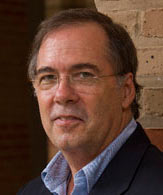Cooper named co-director of Kennedy Institute
Keith Cooper, Rice’s L. John and Ann H. Doerr Professor in Computational Engineering and associate dean for research for the George R. Brown School of Engineering, has been named co-director of the Ken Kennedy Institute for Information Technology.
In announcing the appointment last week, Vice Provost for Research Yousif Shamoo and Kennedy Institute Director Moshe Vardi said Cooper will play a lead role in supporting the institute’s new efforts focused on data science.
“With the emergence of data science as a major intellectual theme, which underlies a broad spectrum of research and scholarship at Rice, the Kennedy Institute is expanding its traditional focus on high-performance computing to also include data science,” Vardi and Shamoo said in an email announcing the appointment. “Keith will play a key role in supporting this expansion of focus, and we look forward to working with him on this endeavor.”
Vardi, Rice’s Karen Ostrum George Professor in Computational Engineering, who has served as director of the Kennedy Institute for more than a decade, will continue to serve as a co-director.
Cooper joined Rice’s faculty in 1990 and conducts research on a variety of problems that arise in the design and implementation of ubiquitous computer programs called compilers. He said he began examining ideas related to data science in early 2014 when he went on a six-month “listening tour” of other academic, industry and government leaders.
“One thing that came out of that was an understanding that there is a tremendous demand in the city of Houston for leadership in data science,” Cooper said. “We do not use the term ‘big data,’ both because big data is overused and it is a very limited term. Big data implies that the only thing of interest is the volume of data. And not all data problems are about volume.”
Cooper said data science problems usually fall into four categories: volume, variety, veracity and velocity. Variety refers to the fact that data can come in many forms that aren’t easy to compare or cross-analyze.
“In health care, a physician might have access to a patient’s health history, blood tests, imaging data from X-rays, a CT scan and a pathology report, as well as the patient’s own comments about what’s bothering them. Bringing all of that together in a cohesive way to provide better care is a 21st Century data science problem,” Cooper said.
Problems of veracity can arise from using data that is collected every day in a nonscientific way, including information generated from social media and other public forums. Velocity refers to situations where massive amounts of data must be processed or sorted quickly, as in real-time patient genome sequencing or high-energy physics experiments.
Cooper said he looks forward to working with Rice faculty across all schools and departments to identify interesting research problems in each of these areas, and to make connections between faculty members who have interesting data problems and faculty members who have the expertise to help solve those problems.
He’ll get one of his first opportunities to do that at the Rice Data Science Meet-up at the BioScience Research Collaborative auditorium from 1 to 5 p.m. Sept. 25. The meet-up, which is co-sponsored by the Kennedy Institute, the Center for Research Computing, Fondren Library, the Humanities Research Center and the Institute of Biosciences and Bioengineering, will offer faculty a chance to network, share and collaborate on data science ideas, projects and technologies.
Cooper said the sponsors hope the meet-up will be the first of a recurring series of meetings where faculty can build campuswide relationships, discover unique assets already available at Rice and form exploratory collaborative research groups.
“Our goal is to start conversations and spur interest in collaborating on intriguing data science problems that could position Rice for additional research funding or lead to new educational offerings,” Cooper said.



Leave a Reply